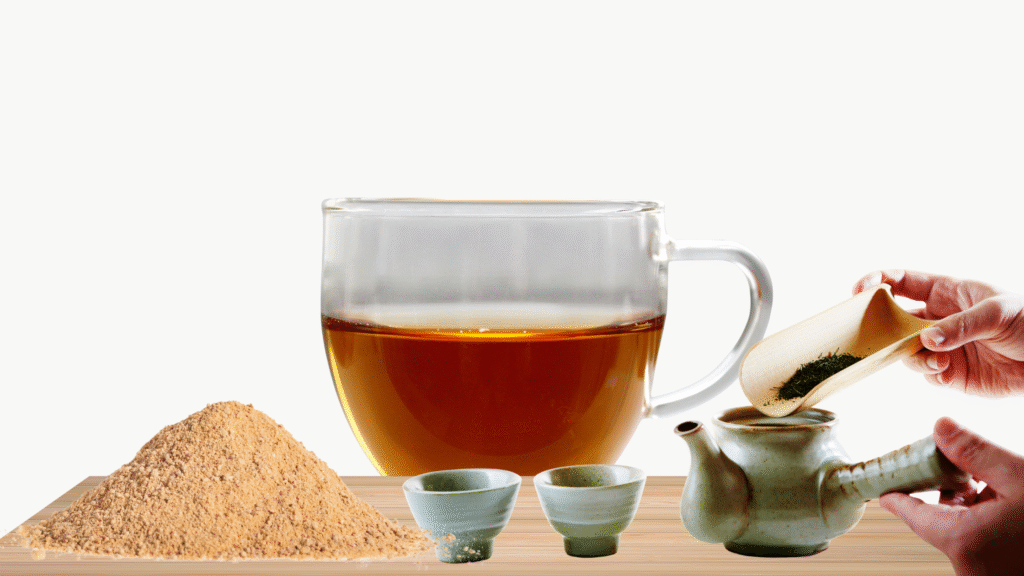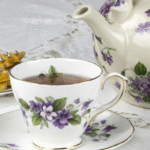Green Tea vs Jasmine Tea: Key Differences, Benefits & Taste
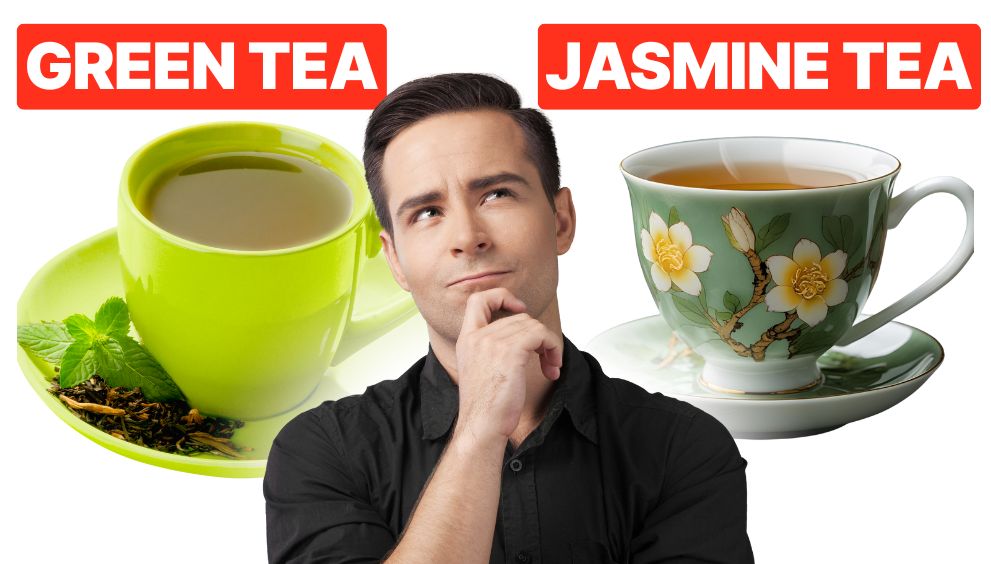
Compare green tea vs jasmine tea in terms of taste, benefits, caffeine content, and more. Discover which one suits your lifestyle and health goals. When choosing a healthy, flavorful tea, many people find themselves comparing green tea to jasmine tea. Both teas are popular among health-conscious drinkers in the USA They offer unique experiences in terms of taste, aroma, and benefits.
1. Green Tea vs Jasmine Tea
Today, I aim to examine the primary differences between green tea and jasmine tea, including their origins, flavour profiles, caffeine content, and associated health benefits. When you’re seeking a tea for weight loss, relaxation, or daily wellness, this side-by-side comparison will help you determine which brew best suits your lifestyle, and you will feel better after this article.
2. What Is Green Tea?
Green tea is widely consumed globally in Asian countries such as China and Japan, and is made from the leaves of the Camellia sinensis plant. Then, it undergoes a minimal oxidation process, which helps develop a green color, an earthy flavor, and a high antioxidant content.
Origin and Processing
Green tea has a thousand-year history. It mainly grows in China, Japan, and some states of India. After harvesting, leaves are steamed or pan-fried to prevent oxidation.
Green tea has a rich history dating back thousands of years and is most commonly grown in China, Japan, and parts of India. After harvesting, the leaves are quickly steamed or pan-fired to stop oxidation. As natural compounds (catechins and polyphenols) are safe, they have many health benefits.
Types of Green Tea
Green tea comes in many varieties, each with its own distinct flavour and preparation method.
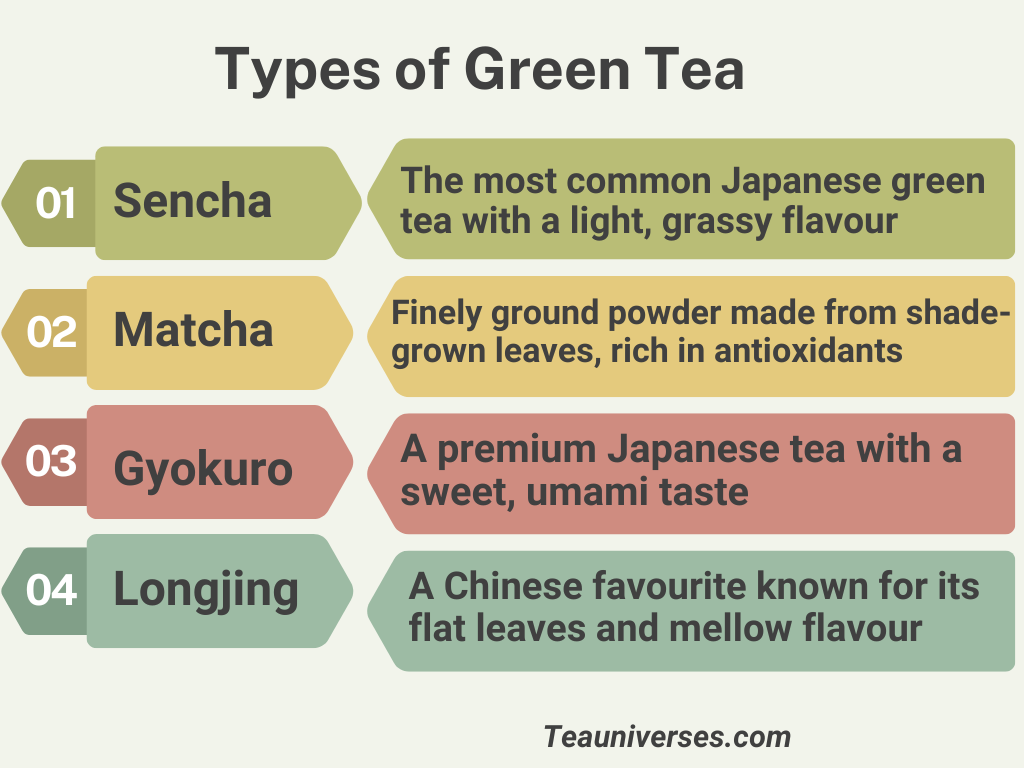
Caffeine Content and Taste Profile
Green tea contains 25–45 mg of caffeine per 8-oz cup, which is less than coffee, but it’s enough to promote alertness. Its taste is grassy, slightly bitter, or vegetal, depending upon how it’s brewed and which type is used.
Health Benefits of Green Tea
Green tea is best known for its:
- Antioxidants (especially EGCG) that protect against cell damage
- Support for metabolism and fat burning
- Potential to improve focus and brain function
- Heart health and blood sugar regulation
These properties make green tea a go-to choice for those seeking to naturally enhance their wellness.
3. What Is Jasmine Tea?
Jasmine tea is a fragrant and soothing tea. Infusing tea leaves with the scent of jasmine flowers. It originated in China during the Song Dynasty. Now it has become one of the most beloved floral teas globally. While often confused with green tea, jasmine tea is a scented tea, not a separate variety of the tea plant.
What Jasmine Tea Is Made From
This tea typically uses a green tea base. But it can also be made with white tea, oolong tea, or even black tea. Its most common version is jasmine green tea, which blends the antioxidant-rich benefits of green tea with the floral notes of jasmine blossoms.
How Jasmine Tea Is Scented
First, layer fresh jasmine flowers over the tea leaves to allow their scent to naturally spread over several hours or days. This step is repeated multiple times to produce higher-quality jasmine teas. It’s a traditional process.
Taste, Aroma, and Unique Features
Jasmine tea is famous for its:
- Sweet, floral aroma
- Smooth, mild flavour with less bitterness than pure green tea
- Calming properties, making it an excellent choice for relaxation and stress relief
It’s unique sensory profile appeals to those who find regular green tea too grassy or strong.
Does Jasmine Tea Have Caffeine?
Yes — jasmine tea contains caffeine, but the amount depends on the tea base used:
- Jasmine green tea: ~25–55 mg caffeine per cup
- Jasmine white tea: lower caffeine (~15 mg)
- Jasmine oolong or black tea: higher caffeine content
So while jasmine tea can provide a gentle energy boost, it’s generally milder than coffee and most black teas. So while jasmine tea can provide a gentle energy boost, it’s usually milder than coffee and most black teas.
4. Key Differences: Green Tea vs Jasmine Tea
The reality is that both teas belong to the same plant (Camellia sinensis). But they have different flavours, aromas, health benefits, and caffeine contents.
4.1 Flavor and Aroma
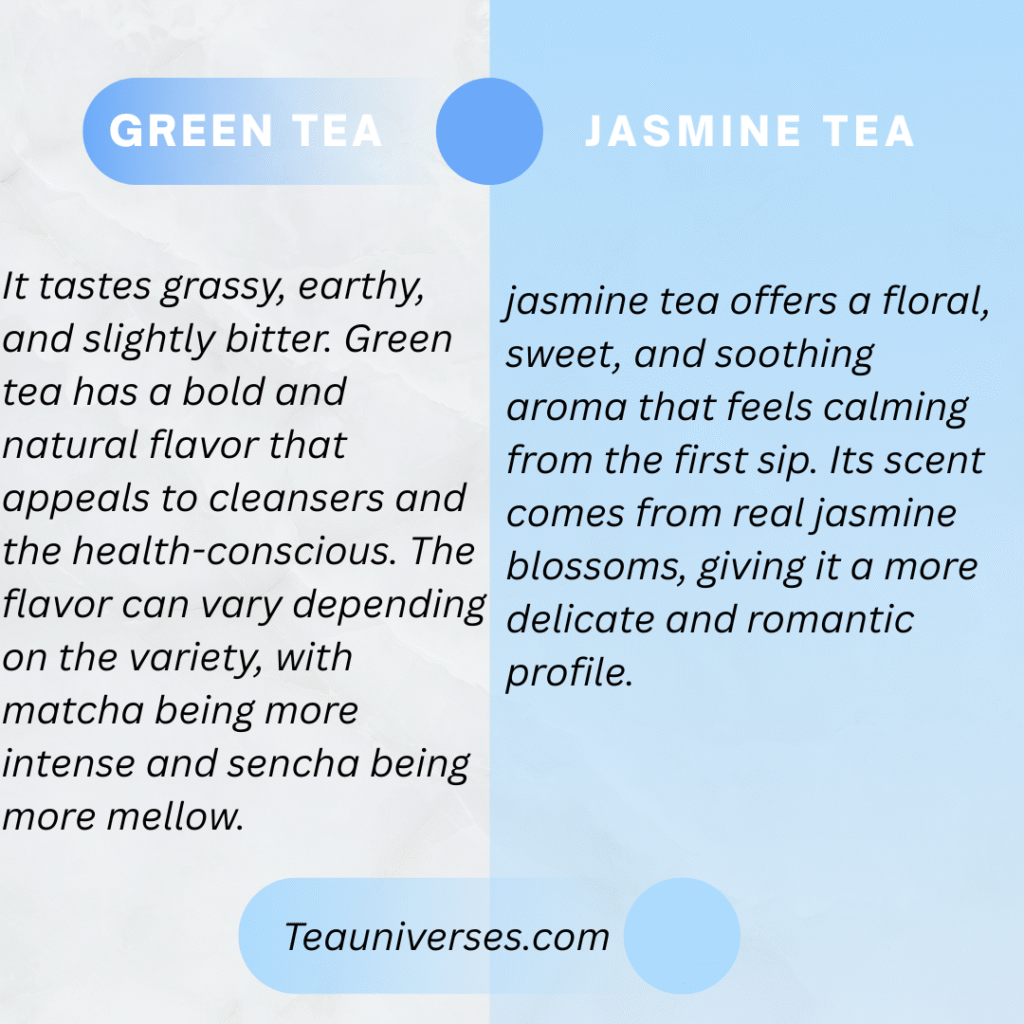
If you’re sensitive to bitterness, jasmine tea’s flavor profile may be more enjoyable than that of standard green tea.
4.2 Caffeine Content
Which has more caffeine?
Green tea and jasmine tea have similar caffeine levels if the base is green tea, but the actual content varies:
Best time to drink:
Green tea is best in the morning or early afternoon to boost energy, and Jasmine tea with a white or oolong base is suitable for the afternoon or evening, as it’s more calming and often lower in caffeine.
4.3 Health Benefits
Both teas offer powerful antioxidants, support digestion, and boost metabolism, making them popular choices among health-focused drinkers.
Green Tea:
- Rich in EGCG, great for fat burning and cognitive function
- Supports heart health and stable energy
Jasmine Tea:
- Contains linalool and other compounds that promote relaxation and mood balance
- Helps reduce stress and may aid in sleep quality
For weight loss?
Both are good, but green tea is more researched for fat burning due to catechins. Jasmine tea, with a green base, can also aid in weight management while calming the mind.
4.4 Relaxation vs Focus
Green Tea for Focus:
Green tea contains L-theanine and caffeine, which work together to promote focus and mental clarity, making it an excellent choice for work or study.
Jasmine Tea for Relaxation:
Thanks to its calming floral scent, jasmine tea helps reduce stress, promote relaxation, and support sleep, especially when made with white or oolong tea.
Choose green tea for increased productivity and jasmine tea for relaxation and unwinding.
5. Which Tea Should You Choose?
Green tea or jasmine tea, which one is best for you, or which you choose, depends on your favourite taste. I want to explain everything to my audience to help them determine which tea is suited to their needs.
Based on Your Health Goals
Based on Your Health Goals
- For weight loss:
Go for green tea. It’s packed with catechins, such as EGCG, that help boost metabolism and fat oxidation. Green tea is often regarded as one of the most effective teas for weight loss. - For relaxation and stress relief:
Choose jasmine tea, especially one with a white tea base. Its floral aroma and calming compounds promote relaxation, reduce anxiety, and may help with sleep. - For sustained energy without jitters:
Green tea is ideal. The Combination of caffeine and L-theanine offers alertness and focus without the crash that comes with coffee.
Best Time to Drink
- Morning: Green tea helps wake you up and kickstart metabolism.
- Afternoon: Jasmine tea promotes calm focus and helps reduce mid-day stress.
- Evening: Opt for jasmine tea with a white or decaf base to unwind.
How do you choose between jasmine tea and green tea? Consider your energy needs and the time of day.
Taste Preference and Aroma Sensitivity
- If you enjoy a clean, earthy, slightly bitter taste, green tea is the perfect match for you.
- If you prefer something floral, mildly sweet, and fragrant, jasmine tea is the better pick.
Individuals sensitive to bitterness may find jasmine tea to be smoother and more enjoyable.
Who Should Avoid Which Tea?
Who Should Avoid Which Tea?
- Pregnancy: Both teas contain caffeine. Limit intake to 1–2 cups a day and consult a doctor.
- Caffeine Sensitivity: Opt for jasmine tea, which is made from white tea and contains less caffeine than green tea.
- Stomach Sensitivity: Jasmine tea may be gentler, while some green teas can cause stomach upset when consumed on an empty stomach.
Green tea or jasmine tea: the best choice depends on your health status, goals, and taste preference.
6. Green Tea vs Jasmine Tea: Side-by-Side Comparison Table
7. Can You Drink Both Teas Together?
Yes, many tea lovers already do! Jasmine green tea is one of the most popular blended teas, combining the floral fragrance of jasmine blossoms with the clean, antioxidant-rich base of green tea.
Blended Jasmine Green Teas
Jasmine green tea is made by scenting green tea leaves with jasmine flowers. This infusion process can take anywhere from a few hours to several days, depending on the quality of the blend. It’s not two separate teas mixed — it’s a carefully crafted fusion.
Benefits of Combining Flavours
- Green tea provides catechins, L-theanine, and metabolism support
- Jasmine adds calming compounds and a pleasant aroma
- The blend offers both alertness and relaxation — ideal for midday wellness
Blending green tea with jasmine enhances flavour complexity while preserving all the health benefits.
How to Brew Jasmine Green Tea
- Water temperature: 75°C–80°C (167°F–176°F)
- Steep time: 2–3 minutes for loose leaves, shorter for bags
- Avoid boiling water — it can make the tea bitter and ruin the floral aroma
- Ideal steeping tools: glass teapot, infuser, or gaiwan
8. How to Brew Each Tea Correctly
The right way of brewing tea that provides you with the best flavour and the maximum health benefits. I’m going to show you how to prepare both green and jasmine tea properly.
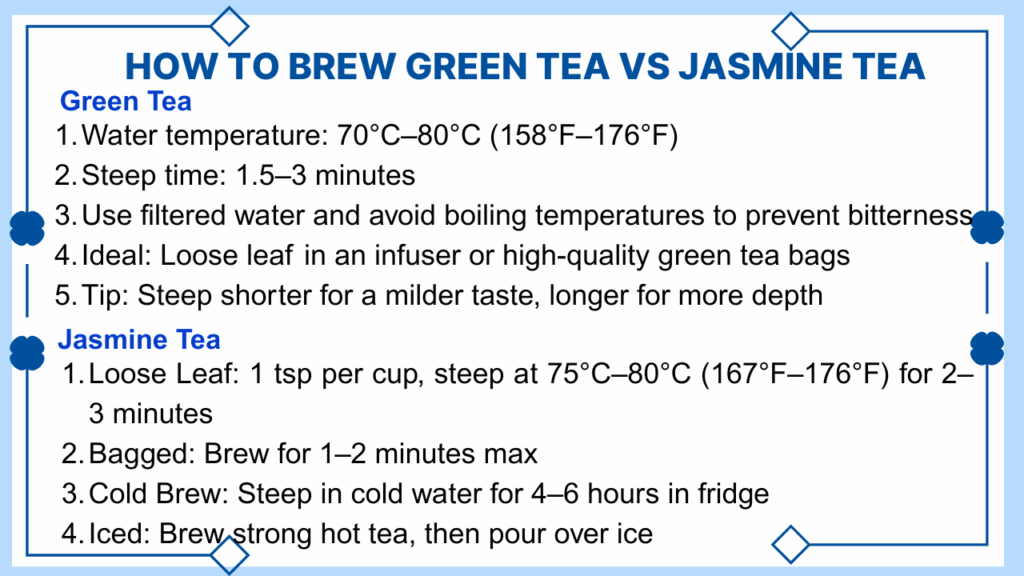
Never over-steep jasmine tea — it can become overly perfumed or bitter.
9. Final Verdict: Green Tea or Jasmine Tea?
Both green tea and jasmine tea offer unique benefits, flavours, and wellness perks, but the right choice depends on your personal needs and taste preferences.
Recap of Key Differences
Which to Drink When
- Need mental clarity or a metabolism boost? Choose green tea in the morning or before work/study.
- Want to unwind or enjoy a soothing aroma? Sip on jasmine tea in the afternoon or evening.
- Can’t decide? Try a blended jasmine green tea for the best of both worlds.
Try Both & Discover Your Favourite
No need to pick a winner — both teas have earned their place in wellness routines worldwide. Whether you’re drawn to green tea’s clean power or jasmine tea’s calming charm, each cup brings something special to the table. Explore, sip, and enjoy your perfect tea, tailored to your lifestyle.
10. Conclusion
There is no clear winner between green tea and jasmine tea, as both offer Multiple benefits for our health and are beneficial for our beauty.
Each tea brings its strengths:
1. Green tea
Shines with its metabolism-boosting and energising properties, making it an ideal choice for enhancing focus and supporting weight management efforts.
2. Jasmine tea
Offers a soothing experience, perfect for stress relief, improved sleep, and those who appreciate floral flavours.
Whether you choose one based on health goals or enjoy both at different times of the day, you’re making a delicious and health-conscious choice.
Which do you prefer, the bold calm of green tea or the floral relaxation of jasmine tea?
I love to hear from you! Please drop a comment below and let us know your favourite, or share how you brew your perfect cup.
11. Frequently Asked Questions (FAQs)
Does jasmine tea help you sleep?
Jasmine tea, when brewed with a white or low-caffeine green tea base, can promote relaxation and better sleep due to its soothing aroma.
Is jasmine tea okay during pregnancy?
Pregnant women should consume jasmine tea in moderation. It contains caffeine and natural compounds that may be harmful to pregnant women with sensitive conditions. Always consult your doctor.
Which tea has more caffeine: green tea or jasmine tea?
Pure green tea usually has slightly more caffeine than jasmine tea. However, jasmine tea made with a green tea base typically has a similar caffeine content.
Does jasmine tea break a fast?
Yes, jasmine tea with zero calories typically does not break a fast. Avoid adding sugar or milk if fasting strictly for metabolic or autophagy benefits.
Which tea is best for digestion?
Green tea and jasmine tea both aid digestion, but jasmine tea’s soothing floral compounds may be gentler on the stomach for some people.
Is jasmine tea green tea or white tea?
Jasmine tea can be made with green, white, or even oolong tea as the base. The most common is jasmine green tea.
Which type of tea is the healthiest?
Green tea, matcha, and oolong rank among the healthiest due to their high antioxidant content. Jasmine green tea offers a great combo of health benefits and calming aroma.
Who should not drink jasmine green tea?
People with caffeine sensitivity, certain heart conditions, or those taking stimulant medications should avoid or limit jasmine green tea.
Can jasmine tea reduce belly fat?
Jasmine tea made with green tea may support weight loss by boosting metabolism. However, it’s not a magic solution — a healthy diet and exercise are essential.
What is the unhealthiest tea?
Teas with artificial flavourings, added sugars, or synthetic sweeteners are considered less healthy. Always choose pure, high-quality loose-leaf or bagged tea.
Which is healthier, jasmine or green tea?
Both are healthy. Green tea may be better for metabolism and alertness; jasmine tea excels at stress relief and mood enhancement.
What is the dark truth about green tea?
Some commercial green teas contain pesticides, added flavours, or heavy metals. Always buy organic or reputable brands to avoid low-quality products.
Does jasmine tea affect hormones?
Although there is limited research, jasmine’s soothing properties may affect mood-related hormones. Still, it’s generally safe for most people in moderation.
Does jasmine tea clear skin?
Jasmine tea’s antioxidants may reduce skin inflammation and improve clarity over time. It’s a great addition to a skin-friendly routine.
What are the five benefits of jasmine?
Reduces stress, improves mood, Aids digestion, promotes healthy skin, and
Enhances immunity: the five benefits of jasmine tea.
Can you drink green tea while fasting?
Yes, plain green tea is ideal for fasting — it contains zero calories and can boost metabolism and curb appetite.
What is the healthiest tea in the world?
Matcha green tea is often considered the healthiest due to its high concentration of antioxidants. Jasmine green tea is a flavorful, stress-relieving alternative.


